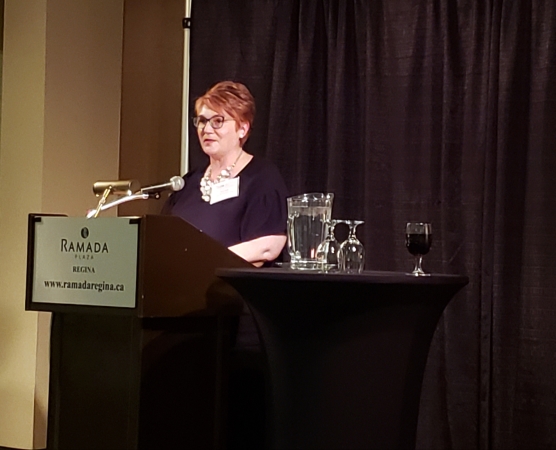Politicians address investment, MELT, and carbon tax during STA event
REGINA, Sask. – Representatives from the provincial and federal governments highlighted how they are backing the trucking industry in Saskatchewan with investments in infrastructure, support for mandatory training, and fighting the carbon tax.
During the Saskatchewan Trucking Association’s (STA) second annual policymakers stakeholders meeting April 10 in Regina, Lori Carr, Minister of Highways and Infrastructure for the provincial government, said this year’s budget puts $706.1 million toward road and infrastructure enhancements.
“This year’s budget will result in upgrades to more than 1,000 km of highway, in addition to the completion of the Regina bypass, which will be completed this fall on budget and on time,” said Carr.
Since 2008, Carr said the provincial government has invested nearly $9 billion into highway and infrastructure improvements.
In 2019, the minister said $20 million will be put toward spot safety improvements on provincial highways, totaling $100 million over a five-year investment.
Another five-year, $65 million investment is earmarked for an enhanced intersection safety program, along with $7 million to reduce the frequency and severity of collisions.
“We understand how vital the trucking industry is to our economy. Exports generate roughly two-thirds of all economic activity in Saskatchewan. And just about everything we produce moves on a truck at some point,” said Carr. “We know that we need well-maintained infrastructure that allows access to other markets across Canada, as well as the rest of the world.”
Kelly Block, MP for Carlton Trail-Eagle Creek and transport shadow minister, said the feeling is mutual at the federal level.
“Transportation is the lifeblood of the Canadian economy, and trucking provides everything,” said Block. “Trucking is the most reliable, efficient, and time-sensitive service for shippers, manufacturers, and retailers. Without you our store shelves would be empty and our farmers’ produce would rot in their bins instead of feeding the world. Canadians rely on safe, dependable, and affordable trucking.”
Part of how Block and a Conservative government would show support for the industry is by scrapping the carbon tax.
“When it comes to environmental policies and carbon emissions, I believe my views align closely with the trucking industry,” she said. “The concept behind the current Liberal government’s carbon tax is that higher costs change behavior.”
But Block believes the only thing the carbon tax has done is hinder the industry by reducing its ability to invest in new technologies, fleets, and employees.
“With the imposition of the carbon tax, I believe the current government is failing to recognize that the trucking industry has already done a lot to reduce carbon emissions,” said Block. “The cost to transport goods in Canada has gone up and will continue to go up as the carbon tax increases…your customers need to know why they are going up.”
Carr agreed, saying the provincial government will also continue to fight against the carbon tax, which, in addition to Saskatchewan, was imposed by the federal government April 1 for Manitoba, Ontario, and New Brunswick.
The federal carbon tax was levied on provinces that did not implement their own plan. The federal tax is set at $20 a ton for 2019, increasing $10 annually until reaching $50 a ton in 2022.
“We strongly believe this tax is not the answer,” said Carr. “Of the many tools government has to combat climate change, a carbon tax will do most harm to our economy while having no impact on our emissions.”
Carr said government should instead focus on investment into new technology that will reduce emissions on a global scale, while not having a negative impact on the economy.
“The carbon tax will take time and money away from fleets that could and should be investing in technology that would help Saskatchewan and Canada with emission reductions,” she said.
Both Carr and Block praised the implementation of the province’s mandatory entry-level driver training (MELT) program.
Block said thought MELT was on the government’s radar for some time, the Humboldt tragedy forced swifter action.
“At the same time, the Government of Canada facilitated a cooperative discussion on the need to implement a Canadian standard,” added Block. “While I’m not in the habit of praising the current federal minister of transport, I wholeheartedly support the collaborative approach that was taken in dealing with this issue.
“I hope and believe that by supporting truck driver training, federal and provincial governments can have a positive impact on the supply of drivers in the future.”
Block stressed the need for more qualified Class 1 drivers in Canada, pointing to a report by the Conference Board of Canada indicating a potential shortfall of 33,000 drivers by 2020.
“While I don’t believe government is the solution to this challenge, I know it can play a part in areas like training and educational programs,” said Block. “But I also believe that this is where the private sector has been and will continue to do most of the heavy lifting.”
Susan Ewart, executive director of the STA, said events like the policymakers stakeholders meeting help with what is the need for a collaborative effort between government and industry to achieve common goals.
“As an association, we are only effective together,” said Ewart. “In this room are words and action; government and industry working together toward common goals of safer roads and a more production economy producing excellent results for our province.”

Have your say
This is a moderated forum. Comments will no longer be published unless they are accompanied by a first and last name and a verifiable email address. (Today's Trucking will not publish or share the email address.) Profane language and content deemed to be libelous, racist, or threatening in nature will not be published under any circumstances.